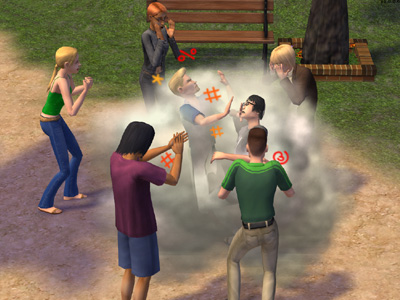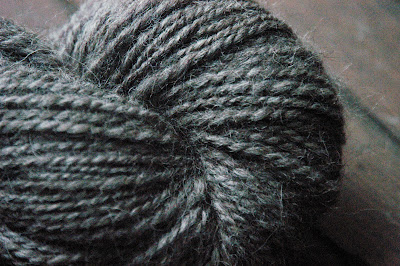I meant to write this post yesterday, since I know I'll never keep up with a blog (or anything else, for that matter) unless I promise myself I'll do it at the same time every week. But we've had unusually warm weather in the East Bay these last few days -- sunny and upper 70's -- so I've been spending a lot of my time outside, neglecting my indoor duties in favor of dog walks at the waterfront, tennis, and a weird hippie-commune BBQ in shady-gang-neighborhood-Oakland. (Somehow 75 in Berkeley seems so much warmer than 75 in Ohio. Maybe it's the lack of air conditioning, maybe it's the presence of mental conditioning. Or the high-frequency, low-efficacy pillow flipping when trying to get to sleep. Or the way my cat sprawls out pathetically on the wood floor because his normal spot on the carpet is too hot.) Anyway, this one's about computer games.
 I had a very instant-gratification playing style. I would create families very quickly, making rash decisions about their clothing and only minimally furnishing their houses. I'd use cheat codes to make them instant millionaires so that they wouldn't have to go to work, or I'd cheat to catapult them to the top level of their careers. I'd focus all my attention on furthering their relationships as quickly as possible, incessantly clicking "Give Massage" or "Tell Dirty Joke" or "Flirt" until they'd graduate from acquaintances to friends, to best friends, then to dating. Days after meeting each other, they'd be married. Kids would soon follow, then affairs, then those domestic clashes where the combatants are engulfed in a ball of dust of mysterious origin, then divorces, and remarriages. That was my MO. They didn't lead very balanced lives. (Lather, rinse, and repeat until everyone in the neighborhood has either slept with or fought to the death with everyone else.) My sister, on the other hand, would carefully choose each Sim's every trait, from eyebrow style to accessories to personality characteristics, and she'd focus her energy on furnishing and interior decorating. (On the other hand, she was my resource for all the cheat codes...)
I had a very instant-gratification playing style. I would create families very quickly, making rash decisions about their clothing and only minimally furnishing their houses. I'd use cheat codes to make them instant millionaires so that they wouldn't have to go to work, or I'd cheat to catapult them to the top level of their careers. I'd focus all my attention on furthering their relationships as quickly as possible, incessantly clicking "Give Massage" or "Tell Dirty Joke" or "Flirt" until they'd graduate from acquaintances to friends, to best friends, then to dating. Days after meeting each other, they'd be married. Kids would soon follow, then affairs, then those domestic clashes where the combatants are engulfed in a ball of dust of mysterious origin, then divorces, and remarriages. That was my MO. They didn't lead very balanced lives. (Lather, rinse, and repeat until everyone in the neighborhood has either slept with or fought to the death with everyone else.) My sister, on the other hand, would carefully choose each Sim's every trait, from eyebrow style to accessories to personality characteristics, and she'd focus her energy on furnishing and interior decorating. (On the other hand, she was my resource for all the cheat codes...)
This does, in a strange way, give me some insight into the way that I live in real life. Not that I'm in any rush to settle down and have kids, and not that I cheat my way out of paying my PG&E bill or that I have a magic button that I can press to automatically clean my toilet or do my dishes. But I do often try to rush to the end of things. This isn't all a bad thing, but it's not all good either. It often means I'll get a lot of very good work done in a very short amount of time, but it also means I can get burnt out quickly and go through long periods where I don't get much done at all. It means I can pick up certain new skills surprisingly quickly, but it also means I have a very hard time juggling multiple activities at once. These days, I'm aiming less for perfection at, or even completion of, any one particular thing, and more for competence at (and enjoyment of!) multiple things. Now instead of reading 300 pages of a book, knitting till I want to pass out, or spending an entire day in the D-level of the campus library, I'll read a chapter or two, then practice my steel drum music for a while, knit a few rows, and then maybe meet a friend for coffee before coming home to study. My life is much more balanced, and there's a sense of continuity and sustainability in each activity that I do. Although it takes me longer to finish a scarf, or to read a book, or to finish a homework assignment, there's a much larger chance that I'll be able to knit a second scarf once the first is finished, read a second book, and continue to keep up the quality of my homework assignments instead of trailing off towards the end of the semester as is my tendency. The aphorism has some truth to it: what would be great must be done daily. It used to be that when people commented on how quickly I'd finish knitting projects, I'd take it as a compliment. But now if someone says that, I take it as a clue I should slow down and do something else for a while.
My friend, who is one of the sweetest, wisest people I know, told me the other day, "Do it in such a way that it remains possible." Maybe that means not doing it at all for a while, so that you'll be able to do it again in the future. Like taking a break from running when you're injured. Sometimes that means doing it for ten hours in a row. Sometimes, that means doing it for half an hour a day, or even just ten minutes, everyday until it's finished. Or maybe it's a habit or a practice, the kind of thing that by nature does not get finished.
That same wise friend has an adorable little dog who loves to chase squirrels on campus. I'll occasionally tag along for what she calls "squirreling", and I'll watch the dog's ears perk up when she sees a squirrel peek its head out from behind a bush, and marvel at her speed as she bolts across the lawn, finding myself sharing her disappointment as the squirrel scampers up a tree. But then there's another squirrel, and the first is forgotten. Turns out it's not about catching the squirrel at all; it's about the thrill of the chase. By the end of an hour, there will be at least a dozen escaped squirrels. And it will have been a perfectly successful afternoon. She'll go home, have a snack, and take a well-deserved nap, perfectly contented. The other day, as I was overanalyzing an aspect of my life that's annoying right now, and being totally convinced that it didn't make any sense, wise friend said: It makes sense if you stop defining success as disemboweling the squirrel. Hmm. Maybe so!









